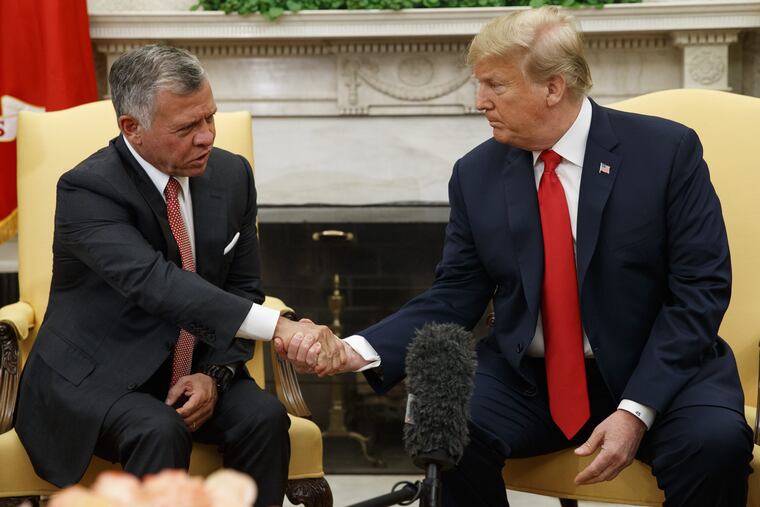Philly-based Templeton Foundation awards $1.45 million religion prize to Jordan’s King Abdullah II
The Templeton Foundation praised the Jordanian head of state for doing "more to seek religious harmony within Islam and between Islam and other religions than any other living political leader."

The John Templeton Foundation has awarded its annual prize recognizing an individual's efforts to advance "life's spiritual dimension" to King Abdullah II of Jordan, who has advocated for religious tolerance, denounced terrorism, and lobbied for peace in the Middle East.
The foundation, headquartered in West Conshohocken, announced the $1.45 million award Wednesday. The king had met with President Trump on Monday to discuss "the threat from Iran and the crisis in Syria, and working toward a lasting peace between Israelis and Palestinians," according to a White House statement.
The prize is to be presented to Abdullah at a Nov. 13 ceremony in Washington. Previous recipients include the 14th Dalai Lama (Tenzin Gyatso), Archbishop Desmond Tutu, Mother Teresa, and the Rev. Billy Graham.
The foundation praised the 56-year-old head of state for leading a reclamation of Islam from the distortions of radicalism and doing "more to seek religious harmony within Islam and between Islam and other religions than any other living political leader."
His work is "inspiring," foundation president Heather Templeton Dill said in a video statement posted on the foundation's website. "He has built upon the power of principled pluralism to extend religious harmony among the 1.8 billion followers of Islam, the world's second largest religion, so that each can recognize one another as Muslims."
The foundation cited Abdullah's Amman Message, a statement he released on the eve of Ramadan in 2004, as a pivotal declaration issued amid the Iraq War. The message outlined the central tenets of Islam and affirmed that terrorism and violence have no place in the religion. The next year, Abdullah organized a conference of 200 Islamic scholars from 50 countries who endorsed its message, which has since been sanctioned by more than 450 Islamic academics.
The king, a direct descendant of the Prophet Muhammad, has spearheaded initiatives that call for peace between Muslims and Christians, sponsored academic study of such initiatives, and hosted waves of refugees fleeing violence and war. He has written extensively on the subject and in 2011 published a memoir, Our Last Best Chance: The Pursuit of Peace in a Time of Peril.
"Our world needs to confront challenges to our shared humanity and values," he said in an acceptance speech posted on the foundation's website. "They are the very ground of the coexistence and harmony our future depends on."
Abdullah is the 47th Templeton winner but the first sitting head of state to be honored by the foundation, which began awarding the prize in 1973. The philanthropic group was created by the American-born mutual fund developer Sir John M. Templeton, who thought the Nobel Prize ignored religion and therefore wanted the monetary amount of his award to be continually adjusted in order to exceed the awards established by Swedish scientist Alfred Nobel in 1895.
The foundation sponsors the study of subjects including science and religion, "supporting research on the Big Questions, and promoting character development, individual freedom, and free markets." It has been criticized for what some scholars view as attempts to use science to validate religion.
Born in Amman, Abdullah is the eldest son of King Hussein of Jordan and his second wife, Princess Muna al-Hussein. During his 46 years in power, Hussein became the United States' most consistent ally in the Arab world, governing as a compassionate statesman with an unshakable commitment to peace.
Abdullah attended the Eaglebrook School and Deerfield Academy in Massachusetts, graduating from Deerfield in 1980. He studied international affairs at Georgetown University in Washington, and prepared to enter the armed forces at the Royal Military Academy Sandhurst in England. He served in the British military before returning to Jordan as commander of the nation's Special Forces.
In 1993, he married Rania Al Yassin, born in Kuwait to Palestinian parents. The couple have four children. Abdullah succeeded his father after his death in 1999.
Abdullah has continued in his father's tradition as an ally of the U.S. and a statesman advocating for peace, said Heather J. Sharkey, a professor of Middle Eastern and Islamic Studies at the University of Pennsylvania.
With limited resources, she said, the landlocked nation of 9.9 million in one of the world's most volatile regions has remained politically stable while hosting millions of Palestinian and Syrian refugees, promoting interfaith study and dialogue, and urging Muslims to "tolerate each other's views."